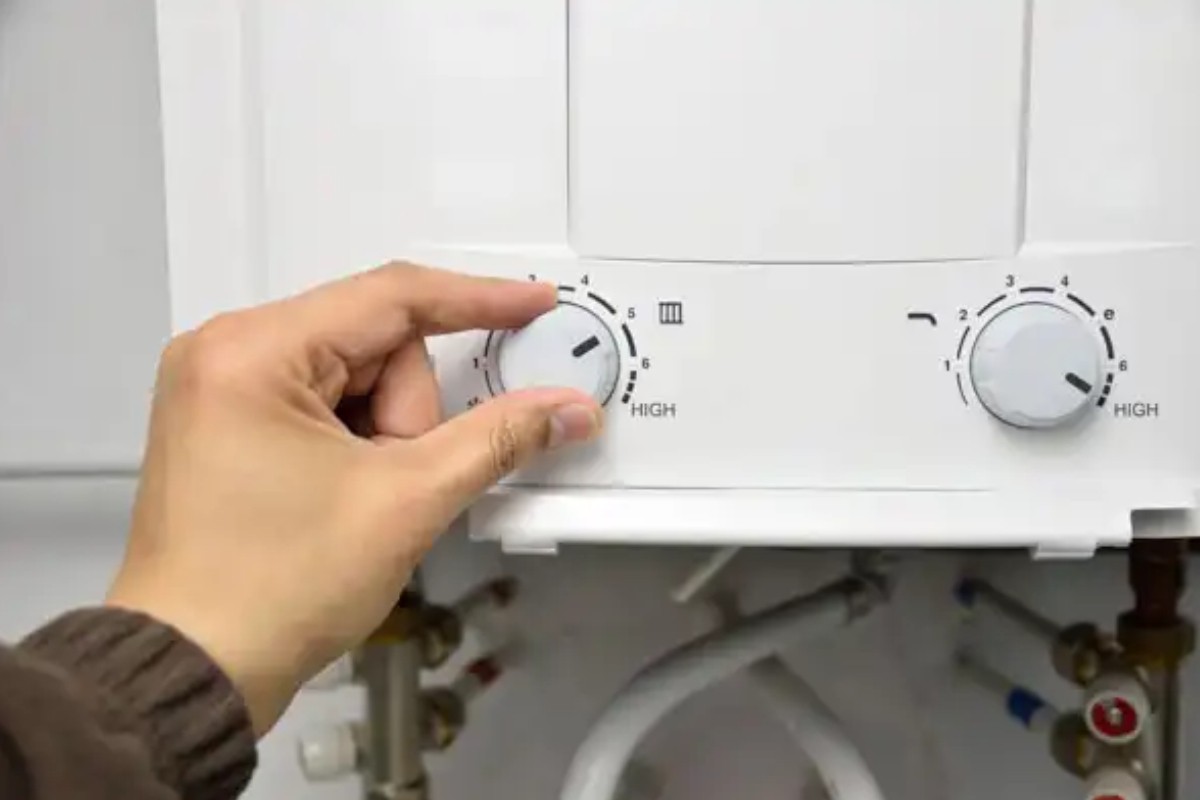When choosing a new water heater for your household, you’ll want to look into not just which one will provide you with enough hot water, but also which one will be the most energy-efficient and save you the most money overall. To do this, you’ll need to consider the various types of water heaters.
The water heater you decide on can affect your life more than you might think. Chances are that you’ve been taking a shower with your hair lathered in shampoo and body full of soap. Suddenly, your water turns ice cold. Not the greatest feeling in the world. Plus, if you live with other family members or roommates, you might even need to schedule showers so each of you will always have enough hot water. Your water heater can also impact your utility bills and possibly even your home decor choices and storage.
Knowing the different types of water heaters is a good idea to help you make an informed purchasing decision. Each type of water heater is different in size, fuel type, cost and energy efficiency.
Here, we’ll talk about the difference between tankless vs. tank water heaters.
What Are the Pros and Cons of a Traditional Water Heater?
Since tankless water heaters have the reputation of being smaller in size and efficient, many individuals tend to think they’re always the better choice. Depending on your circumstances, however, a tank water heater may be the better choice for you.
Here are some of the pros of traditional water heaters:
- Cost: They’re more affordable in upfront costs.
- Installation: They’re easier to install. Electric tank water heaters are often easily installed without having to make considerable changes to the electrical system of your home or without having to buy costly additional equipment.
- Reputation: They’re tried and true systems.
- Emergency: They always have a fresh supply of hot water in the tank.
There are some cons to traditional water heaters, including:
- Energy waste: This is through “standby loss.” You waste energy keeping the water in the tank hot all the time.
- Lifespan: Tank water heaters have a shorter lifespan.
- Water leaks: Gallons of water can escape or leak from the tank if the heater malfunctions.
- Wait: If you were to empty the tank, you’ll need to wait for hot water to fill the tank again.
If you have budget or timeline constraints preventing you from obtaining a tankless system, the tank water heater could be an ideal solution. If your household runs mainly on electricity, then you’ll want to carefully consider if it’s beneficial to choose a tankless water heater.
What Are the Pros and Cons of a Tankless Water Heater?
A tankless heater uses electric coils or gas to heat your water on demand. You measure the tankless water heater’s flow rate in gallons per minute of hot water it produces. Electric heaters typically heat water slower than gas heaters.
Here are the advantages of a tankless water heater:
- Lifespan: Tankless water heaters have a longer lifespan.
- Efficiency: You do not have to pay to maintain a full tank of hot water as it heats water on demand.
- Warranty: These water heaters often have more extensive warranties.
- Space: Tankless water heaters are smaller than traditional water heaters, saving you space.
- Cost: If your home has gas available, and you can install the tankless heater without too much extra cost, this type could save you money.
- Installation location: You can have tankless water heaters installed outside. Near washing machines, under sinks or near showers can also be ideal places to install tankless water heaters if you live in an RV or tiny home.
- Property value improvement: If many people in your area are upgrading to tankless water heaters, it might be ideal to go tankless as well so your property stays competitive with the other homes your neighborhood.
And here are some of the disadvantages of tankless water heaters:
- Cost: Tankless water heaters have a higher cost for upfront equipment and installation. Sometimes, the higher upfront cost might be bigger than what you save long-term.
- Change: You might have to make significant changes to your house to accommodate a tankless water heater.
- Flow rate limitations: Tankless water heaters have an output limit on its flow rate, meaning your heater might not be able to provide you with hot water fast enough if you’re doing the laundry, running the dishwasher and taking a shower all at the same time.
What Is the Difference Between a Tank and Tankless Water Heater?
When it’s time for you to replace your home’s water heater, you should consider the efficiency, cost and longevity of the unit you’ll have in your home. A water heater can be an expensive investment, but the investment could last you over a decade.
Let’s look closer at the differences between a tankless water heater vs. tank water heater.
Tankless Water Heater
Tankless water heaters heat water rapidly through high powered burners as it flows through the heat exchanger and then into the faucets without a tank. They are usually electric or gas-powered. This water heater is energy efficient since it only heats the water when you use it.
1. Installation
Making the switch from a tank water heater to a tankless one isn’t just a simple swap since it requires a plumbing retrofit and potentially an upgrade to your gas lines or electric service to increase capacity. Since 90% of installations of hot water heaters occur when there’s an emergency, you may be at a disadvantage when negotiating with a contractor or prospective plumber to make the switch when you’re in a pinch.
2. Gallons of Water Use
For households using 41 gallons of hot water or less daily, tankless water heaters can be around 24 to 34% more efficient on energy than tank water heaters. Even if you use more hot water — up to 86 gallons each day — tankless water heaters can still be 8 to 14% more efficient more energy efficient. By installing a tankless water heater at every hot water outlet, you could achieve even more energy savings of around 27 to 50%.
Usually, a tankless water heater provides hot water at a two to five gallon per minute rate. A gas-fired tankless water heater produces a higher flow rate than an electric one. In some cases, though, even the biggest gas-fire model can’t provide enough hot water for multiple, simultaneous uses in bigger households. For instance, you could stretch your tankless water heater to its limit if you simultaneously run your dishwasher and take a shower.
If you want to overcome this issue, you could install more tankless heaters, attached in parallel for multiple, simultaneous hot water demands. You could also install different tankless heaters for appliances that use a lot of water, such as your dishwasher or washing machine.
You can avoid the standby heat losses linked with tank water heaters by installing a tankless water heater instead. But, while gas-fired tankless systems often have a higher flow rate than the electric ones, they could waste energy if they have a continually burning pilot light. This could, in some cases, offset the removal of standby energy losses when you compare it to a tank water heater. You don’t waste energy in a gas-fired tank water heater since the pilot light heats the water inside the tank.
3. Price With Installation
The initial cost of going tankless over a tank water heater is greater. However, tankless water heaters tend to:
- Last longer: Some last longer than 20 years.
- Have lower energy: Tankless systems are more energy-efficient.
- Have lower operating costs: This offsets their higher initial cost.
The cost of installation varies depending on several factors, including:
- The brand of water heater you’re installing.
- The type of water heater you’re installing.
- If you’re replacing an old unit or installing a new one.
- Your home and its specifics.
A tankless water heater installation can range from $2,000 to $6,000. This accounts for the heater itself, installation, permits, materials and removal of the old water heater.
The expense of running a pilot light in a tankless system will vary from model to model. You’ll want to ask the manufacturer the amount of gas the pilot light uses for your chosen model. If you buy a model with a standing pilot light, you could always turn it off when you’re not using it to save energy. You might also want to consider a model with an intermittent ignition device (IID). The IID looks like the spark ignition device you see on some gas kitchen ovens and ranges.
4. Lifespan
If your tank water heater is getting closer to the end of its lifespan, and you want to save energy and space, it could be worth it to take a look at a tankless water heater. A tankless water heater lifespan is 20 or more years for most units.
Tank Water Heater
A tank or traditional water heater is insulated and typically heats and stores 30 to 50 gallons of water until it’s needed. Tanks come in natural gas, electric and propane models. During a power outage, the gas models continue working.
1. Installation
A tank water heater is relatively simple to install with installation generally only taking a couple of hours. You typically need to have the tank water heater installed indoors because they can’t tolerate poor weather conditions. Many individuals choose inconspicuous areas to install them like garages or closets. But, in older homes, particularly, you could find it installed in the kitchen.
2. Gallons of Water Use
A tank water heater generally holds around 20 to 80 gallons of hot water in a storage tank. They’re relatively large and need a bit of space in your house. If you happen to deplete the tank, you’ll need to wait until the heater makes more hot water.
3. Price With Installation
The installation cost of a tank water heater will vary depending on its size, type and specifics of your home. The expense could be between $950 and $2,000. Again, this usually accounts for the heater, installation, cost of permits, removal of old unit and materials.
4. Lifespan
A tank water heater life expectancy is between 10 and 15 years.
Is a Tankless Water Heater Worth It?
So, does a tankless water heater save you money? Is it really energy efficient? And, is it a good investment? The answer to these questions is not a simple yes or no. While tankless units are energy-efficient and can pay themselves off quickly, they might not be ideal for you. Some households, for instance, might have needs exceeding the capabilities of a tankless water heater.
A tankless water heater is likely going to save you $1,800 at most over its entire lifespan, according to ENERGY STAR. If the additional expenses of installing your tankless unit are going to outweigh the money you will potentially save, you might want to go with a tank unit instead.
A tankless water heater unit is more complicated than standard models because of their electronics, resulting in a corresponding increase in cost. But, the energy savings long-term can make up for this difference and is often worth the extra investment you put into a tankless system. Properly installing and maintaining tankless water heaters can optimize their energy efficiency.
Because there are many factors going into proper installation like climate, fuel type, safety issues and local building code requirements, you’ll want to hire a qualified plumbing professional to install your tankless water heater. They can ensure the job gets done safely and accurately.
Contact Dick Ray for Your Water Heater Installation or Repair
If you live in the Kansas City metro area and require hot water heater repair or replacement, you’ll want to contact Dick Ray Master Plumbing, Heating and Cooling to ensure it’s taken care of before an emergency happens and you end up with no hot water or a flooded home.
We perform a whole range of water heater services for both tankless water heaters and tank water heaters. If we believe you require a replacement of your old water heater, we’ll advise you on which would better suit your situation. We can install your new water heater at an affordable price, which will save you from the mess and headache of a burst water heater later on.
Even if you don’t need a complete replacement of your hot water heater, do you want to wash your dishes or take a shower in cold water? It’s likely you don’t since it can be very unpleasant. That’s why you’ll want to have your hot water heater repaired as soon as possible.
Dick Ray Master Plumbing is your resource for safe plumbing needs and has a friendly, professional team ready to serve you. We care about our customers and pride ourselves on our outstanding service.
Contact us today to set up your appointment for your water heater or plumbing needs.





